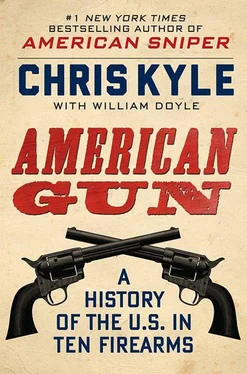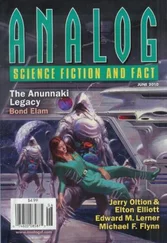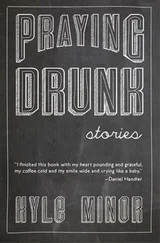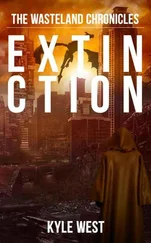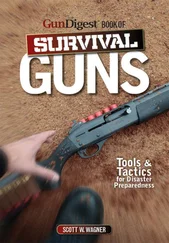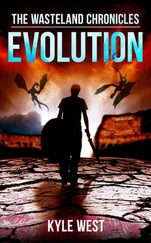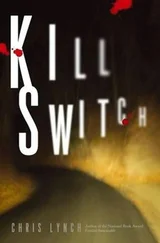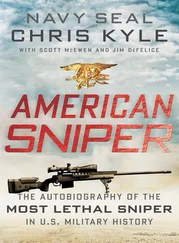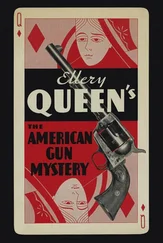“The enemy front is not the goal”: Roman Johann Jarymowycz, Cavalry from Hoof to Track (2008), p. 18.
“seldom has a battle”: John Marshall, The Life of George Washington (1843), p. 404.
“an unbroken chain of consequences”: George Otto Trevelyan, George the Third and Charles Fox, Volume 2 (1915), p. 141.
“a tall man with flowing hair”: Wallace O. Chariton, Exploring Alamo Legends (1992), p. 470.
“Now hold your fire, men”: Louis Wiltz Kemp, Edward W. Kilman; The Battle of San Jacinto and the San Jacinto Campaign (1947), p. 13.
“Take prisoners like the Meskins do!”: T. R. Fehrenbach, Lone Star: A History of Texas and the Texans (2000), p. 232.
“Parade! Parade!”: James W. Pohl, The Battle of San Jacinto (1989), p. 43.
“San Jacinto! San Jacinto!” “The scene that followed”: Ferenbach, Lone Star, p. 234.
“be generous to the vanquished”, “You should have remembered”: Charles Edwards Lester, The Life of Sam Houston (1860), p. 147.
Chapter 2: The Spencer Repeater
“What kind of Hell-fired guns have your men got?” Alexander Rose, American Rifle: A Biography (2009), p. 147.
Details and dialogue of Lincoln’s shooting guns in spring of 1861: ibid., page 143; and William Osborn Stoddard, Inside the White House in War Times (1890), p. 41–44.
“I believe I can make this gun shoot better.” Robert V. Bruce, Lincoln and the Tools of War (1956), p. 115.
“handled the rifle like a veteran marksman”, “Boys, this reminds me”: Charles Augustus Stevens, Berdan’s United States Sharpshooters in the Army of the Potomac (1892), p. 10.
“newfangled gimcracks”: Phil Leigh, The Union’s ‘Newfangled Gimcracks,’ ” NYT Blogs, January 23, 2012.
“Hoover’s Gap was the first battle where the Spencer”: Larry M. Strayer, Richard A. Baumgartner, Echoes of Battle (1996), p. 18.
“Those Yankees have got rifles”, “What kind of Hell-fired guns have your men got?”: Alexander Rose, American Rifle: A Biography (2009), p. 147.
“a circus rider gone mad”: James Welch, Paul Stekler, Killing Custer (1997), p. 57.
“come on, you Wolverines!”: Edward G. Longacre, Custer And His Wolverines (2004), p. 143.
“the most dramatic, largest man-to-man”: Paul D. Walker, The Cavalry Battle That Saved the Union (2002), p. 15.
“the inwardness of the thing”: ibid. p. 147.
“you are younger than I am”: Bruce, Lincoln and the Tools of War, p. 263.
“This evening and yesterday evening”: John Hay, Letters of John Hay and Extracts From Diary (1908), p. 93.
“There is no doubt that the Spencer carbine”: Bruce, Lincoln and the Tools of War, p. 290.
“If a large part of the Union Army”: ibid., p. 102.
Valuable information on the Ordnance Department and other facets of Army supply were provided by The Sinews of War: Army Logistics, 1775–1953, by James A. Huston, Center of Military History, 1997.
Chapter 3: The Colt Single-Action Army Revolver
“The good people of this world”: Herbert G. Houze, Samuel Colt: Arms, Art, and Invention (2006), p. 1.
“yonder comes a thousand Indians!”: Andrew Sowell, Early Settlers and Indian Fighters of Southwest Texas (1900), p. 319.
“They are fixin’ to charge us”: Frederic Remington, “How the Law Got Into the Chaparral,” Harper’s magazine, December 1896, p. 60.
“Crowd them!”: Sowell, Early Settlers and Indian Fighters of Southwest Texas, p. 320.
“Any man who has a load” Mary A. Maverick, Memoirs of Mary A. Maverick (1921), p. 83.
“Sometimes a bad horse would blow up”: “Glocks vs. Peacemakers,” American Handgunner, May 1, 2005.
Davis incident: Massad Ayoob, “The Jonathan Davis Incident,” published online in American Handgunner, The Ayoob Files, February 21, 2013.
Butch and Sundance dialogue: Massad Ayoob, “Butch Cassidy and the Sundance Kid: How did They Really Die?”, American Handgunner, January/February 2011, p. 74–5.
“strange character,”: Joseph G. Rosa, They Called Him Wild Bill (2011), p. 111.
“He was a broad-shouldered”: Joseph G. Rosa, “Wild Bill Hickok: Pistoleer, Peace Officer and Folk Hero,” originally published by Wild West magazine, published online by historynet.com: June 12, 2006.
“Bill beat them to it”: Helen Cody Wetmore, Zane Grey, Last of the Great Scouts (1918), p. 329.
“The secret of Bill’s success”: Joseph G. Rosa, Wild Bill Hickok, Gunfighter (2001), p. 48.
“Whenever you get into a row”: George Ward Nichols, Wild Bill (1867), p. 285.
“Charlie, I hope you never have to shoot”: Eugene Cunningham, Triggernometry: A Gallery of Gunfighters (1941), Introduction, p. xx.
Hickok-Tutt gunfight details: William Connelley, Wild Bill and His Era (1933), pp. 84–5; Rosa, Wild Bill Hickok (1996), pp. 116–23.
“I never allowed a man to get the drop on me”: Joseph Rosa, Wild Bill Hickok, p. 109.
“Seven men shoot at each other”: Massad Ayoob, “The OK Corral Shootout,” American Handgunner, May 1, 2007.
“The gunfight came in bursts”: Casey Tefertiller, Wyatt Earp (1997), p. 122
Additional detail for this chapter is from John Taffin, John Taffin’s Book of the .44, published online at sixguns.com.
Chapter 4: The Winchester 1873 Rifle
“The Winchester stocked and sighted”: Theodore Roosevelt, The Works of Theodore Roosevelt—Volume 3 (1902), p. 38.
Dalton Gang’s raid on Coffeyville banks: Robert Barr Smith, Daltons! The Raid on Coffeyville, Kansas (1999), pp. 83–150.
Like many others, newspaper editor David Elliott spelled Bill Power’s name as “Powers.” Powers may in fact have been the actual spelling, as many relatives before and after styled it that way. But it’s Power on the official tombstone, and that’s what I used here.
“The Sharps was a different kind”: Keith McCafferty, “Guns of the Frontier,” Field & Stream, February 1997, p. 35.
Little Bighorn details: Thomas Powers, “How the Battle of Little Bighorn Was Won,” Smithsonian magazine, November 2010; Hamlin Garland, “General Custer’s Last Fight as Seen by Two Moon,” McClure’s magazine, September 1898, p. 446; Richard G. Hardorff, Lakota Recollections of the Custer Fight (1991), p. 44; Doug Scott, email to the authors.
“is by all odds the best weapon”: Theodore Roosevelt, Hunting Trips of a Ranchman (1904), p. 39.
“carries far and straight”: Theodore Roosevelt, “Ranch-life and Game-shooting in the West,” Outing magazine, March 1886, p. 616.
“No one but he who has partaken”: Lamar Underwood, Theodore Roosevelt on Hunting (2006).
Chapter 5: The M1903 Springfield
“The French told us”: Alan Axelrod, Miracle at Belleau Wood (2007), p. 2.
Details of the Battle at San Juan Heights, Cuba are from: Theodore Roosevelt, The Rough Riders (1899); Richard Harding Davis, Notes of a War Correspondent (1911); Herschel V. Cashin, Under Fire With the 10th U.S. Cavalry (1902); and Peggy Samuels, Harold Samuels, Teddy Roosevelt at San Juan (1997).
“The armory also spawned a culture”: John Lehman, “Bookshelf: Save Ammunition, Lose Wars,” Wall Street Journal, March 9, 1995.
“I think that ramrod bayonet”: United States Army Ordnance Department, Report of the Chief of Ordnance, 1905, p. 129.
Читать дальше
